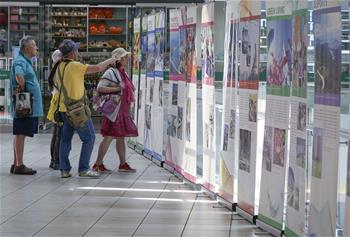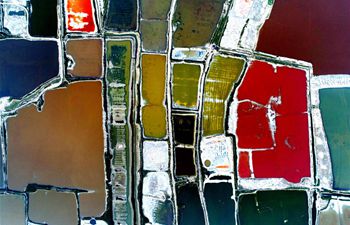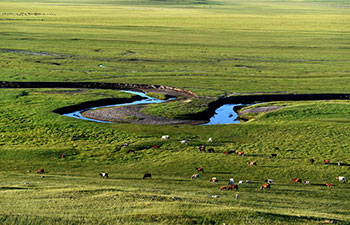By Maria Spiliopoulou
ATHENS, July 26 (Xinhua) -- Following the shock and agony, Greeks are looking into the causes of one of the deadliest tragedies to hit the country in over a decade.
At least 83 lives were lost, 187 people were injured and a yet unclear number of people were missing by Thursday, after a wildfire swept on Monday through coastal settlements, 30 kilometers east of Athens, according to the latest official count.
As rain fell on Thursday helping firefighters to extinguish the last flames, but also hampering efforts to trace survivors, policy makers, experts and ordinary citizens were debating over the factors which contributed to the catastrophe and measures to avert future tragedies caused by wildfires or floods.
What happened at Mati and Neos Voutzas this week was "a tragedy waiting to happen" for several years, locals such as Fotis Provatas, former vice mayor of the City of Athens, told Xinhua.
They pointed to problematic urban planning which blocked the quick escape of thousands of people to the sea and lack of emergency preparedness.
The town plan in Mati acted as a "death trap", Professor of dynamic tectonics and applied geology Efthymios Lekkas told local SKAI TV.
"It was the extreme weather phenomenon, the wind gusts, the speed of the fire, the forest that had not been cleared, the morphology of the terrain that helped its rapid advance, but the decisive factor was the layout of the buildings and roads that trapped people," he said.
It was a plan that included roads that led to dead ends, to cliffs above the sea, or fenced properties, he explained.
The most alarming fact highlighted in the debate was that Mati and Neos Voutzas were the rule and not the exception in seaside towns across Greece.
Very few Greek towns were built in an appropriate way and it was now a question of what could be done in all the areas that had been developed in the last four or five decades, with multiple violations of town planning rules, Professor Lekkas stressed.
Transport and Infrastructure Minister Christos Spirtzis announced on Thursday a survey of building permits in Mati.
Exceptional conditions with gusts of wind that reached record speeds of up to 120 kilometers per hour were at least partly to blame for the devastation inflicted by the fire, the head of the National Observatory of Athens and Professor of astronomy Manolis Pleionis told Greek national news agency AMNA.
But mainly it was chronic "mistakes and oversights" Costas Synolakis, Professor of natural hazards at the Technical University of Crete's School of Environmental Engineering, commented in "Kathimerini" (Daily) newspaper.
"Monday's fires raged out of control, raising the question of whether the initial response was inadequate. The response time to any fire, whether in a city or a forest, is critical," Professor Synolakis noted.
"As we stressed in an older study conducted with Georgios Karagiannis at the Technical University of Crete, understanding the situation, gauging the resources required and assessing the mobilization time are the biggest challenges in any disaster response," Synolakis wrote.
"The announcement of a wildfire in a well-known high-risk area should have sounded the alarm for the instant deployment of more firefighting resources before the fire spread...
"The fire should not be allowed to reach people's yards before they are ordered to abandon their homes. Greece has only a handful of areas that have carried out civil protection drills," the Greek expert underlined.
The government has implied that in Mati's case there was a deliberate arson plan. The fire started in a forest of particularly flammable pine trees on Mountain Penteli as strong winds blew in the area.
Penteli Mayor Dimitris Stergiou suggested another scenario when speaking to local media on Thursday -- that a cut Public Power Corporation cable started the deadly wildfire.
Stergiou told "in-gr" news portal that he was on the scene just minutes after the fire broke out.
He said he spotted a cut cable from the Public Power Corporation's outdated electricity network and alerted the Fire Service. "I suspect that this is what started the fire. It exploded like an atomic bomb," Stergiou said.













